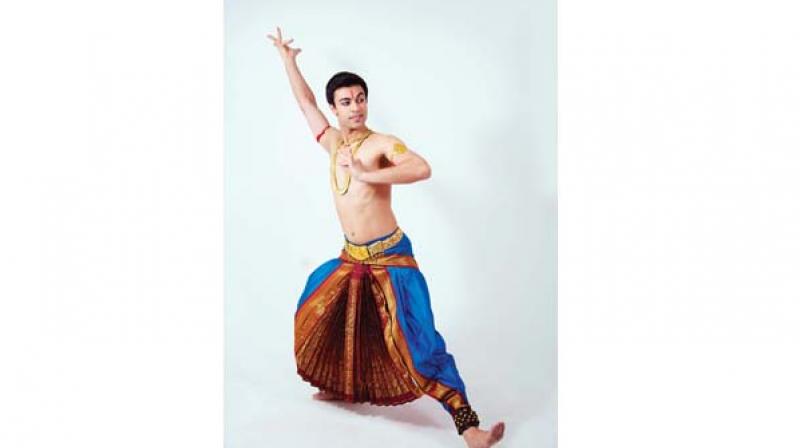Telling new stories traditionally
Revanta Sarabhai marks his grandmother Mrinalini Sarabhai's centenary year with a dance performance in the city.

Being relevant is being contemporary. The entire conversation with dancer Revanta Sarabhai could be distilled into this statement. He is in town this weekend to perform his new repertoire as well as speak about the process. And to understand his ideology, one probably needs to dwell on his pedigree. “People hear my last name and immediately dwell on my illustrious family of dancers (his grandmother is Mrinalini and mother Mallika Sarabhai). The expectations are always very high,” he laughs. One thing that he says influenced him as a child was the ambiance in the house which was filled with the sounds of dance practice and accompanying classical music. He woke up to it every morning and at the age of five, asked to learn Bharatanatyam formally. “My grandmother and mother were delighted that I had voluntarily wished to learn dance.”
Thus began his initiation and training in the Pandanallur style of Bharatanatyam which is the style that Mrinalini Sarabhai had mastered. Apart from his mother and grandmother - whom Revanta calls as his main influencers and mentors - the senior gurus of the Darpana Academy of Performing Arts (which was founded in Ahmedabad in 1949 by Mrinalini and Vikram Sarabhai) especially Maheshwari Nagaraj played a huge role in shaping him as a classical dancer.
When he was 14, Revanta’s ‘Aradhana’ or ‘Arengetram’ was held as a formal initiation into the dance world as a performer. He later did his Masters in Performance and Creative Research from the University of Roehampton in London and tried to establish himself as a dancer there. “The dance I learned there was not natural to me,” he said. “The aesthetics were different. Besides, trying to be an established dancer there was a struggle, as he puts it, “day in and day out”. In 2014, he returned to Ahmedabad and decided to choreograph and dance. The work his grandmother and mother did in breaking out from the norms of Bharatanatyam, using it as a tool to espouse or highlight issues, became the guideline for him stepping out as well.
“However, I got closer to my roots,” he said. Questioning the relevance of age-old stories described in Bharatanatyam, Revanta decided to use the traditional dance format to tell new stories. For someone “not very religious” telling stories of Gods and Goddesses became tedious and so did some of the gender roles defined by Bharatanatyam. As he explained, padams performed by women were about pining for their lovers and those performed by men were bhakti based and about their devotion to God. “But men too long for their lovers.”
Revanta discussed the time in London when he was having a long distance relationship with his girlfriend; juggling timelines, busy schedules and waiting online to chat with her. “That was tough.” It became his first piece which he performed using Bharatanatyam. The process was similar to choreographing a traditional story but for one exception. The story in English format had to be rewritten in classical Tamil poetry and then ‘fleshed out’ with dance movements. “My gurus and I discussed the various mudras and expressions which could be used to tell the story. Sometimes, sanchari bhaava or a traditional storytelling tool is used. This is how traditionally gurus do the choreography for retelling any story.” As a nod to non Tamil speakers, English translations of the lyrics are projected on a screen making the tableau instantly relatable.
Slowly, he built up his repertoire and the padams, varnams and kirtanams with modern day subjects. For instance, the all too familiar narrative of the role of human beings in plundering natural resources and destroying the planet earth is expressed through a kirtana. “A kirtana is usually about describing Gods or devi,” he explained. Revanta’s kirtana talks about the Trinity and the “twist” is in the description of Shiva, the Destroyer. Do we need Shiva as destroyer when human beings are destroying everything because of their greed, he asks. Using age-old dance to make the present day generation mull over the answers is refreshing.
What: Revanta Sarabhai Bharatanatyam
When & Where: February 8, Time: 8pm at Atta Galatta
February 10, Time: 3pm and 6.30pm at Jagriti Theatre

